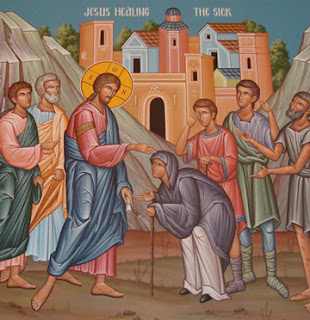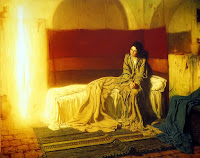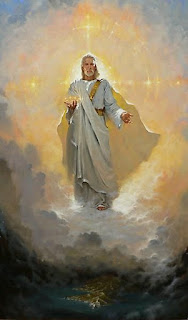1st Sunday after Easter
John 20:19-29
On
the evening of the first day after Coptic
the Sabbath, the disciples were together
with the doors locked for fear of the authorities. Jesus came and stood in
their midst and said, “Peace be with you!”And while he said this, he showed
them his hands and his side.
Full of joy, the disciples recognized the Lord. And again he said, “Peace be with you. As the Father has sent me, so I am sending you.” And when he said this, he breathed on them and said, “Receive the Holy Spirit through which the world will receive healing. From now on, you shall work in human destinies with spiritual power so that they shall have the strength to wrest themselves free from the load of sin, and at the same time to bear the consequences of their offenses.”
Now Thomas, one of the
twelve, called the Twin, was not there with them when Jesus came. Later the
disciples said to him, “We have seen the Lord.” But he replied, “If I do not
see in his hand the marks of the nails, and do not put my finger in the place
where the nails were, and place my hand in his side, I cannot believe it.” Morgan Psalter
Eight days later, the
disciples were again gathered in the inner room, and Thomas was with them.
Though the doors were locked, Jesus came and stood in their midst and said,
“Peace be with you.” Then he said to Thomas, “Stretch out your finger and see
my hands, and stretch out your hand and put it into my side. Be not rigid in
your heart, but rather feel and trust in my power in your heart.”
Then Thomas said to him, “You are the Lord of my soul; you are the God whom I serve.” And Jesus said to him, “Have you found my power in yourself because you have seen me? Blessed are those who find my power in their hearts, even when their eye does not yet see me.”
1st After Easter
April 24,
2022
John 20:19-29
A child of two or three is absorbed with learning about the sense world, exploring and naming things. But around four, there comes a moment when the child will close its eyes and say, ‘I can see pictures’. An inner eye opens, and the faculty of picture-making, of imagination, day-dreaming, and ultimately of memory is born. Some children can then also image real beings that cannot be seen with outer eyes.
Tissot
The disciples
of Christ spent three years with Him, getting to know him in the sense world.
They learned to name Him. After the great panorama of His tragic death, He was
lost to their ordinary sight. But their love for Him had readied them to see
Him with the imaging faculty of their hearts. He comes to them, and they see
Him with the eye of the heart.
In His coming, He gives them a task: He breathes into them holy, healing Spirit, in order that they may work in a strengthening, healing way in the destinies of those whom they meet. Their hearts are to be open, filled with trust in His power, so that they may also see Him at work in the lives of others. They begin to trust in His power working in their hearts, in others, as a new capacity of seeing.
Poet Denise Levertov describes this moment of awakening in her poem about St. Thomas, who says:
But when my
hand
Led by His
hand’s firm clasp
Entered the
unhealed wound,
 |
| Wayne Forte |
Rib-bone and
pulsing heat,
What I felt
was…
…light, light
streaming
Into me, over
me, filling the room…
I witnessed
all things
quicken to color, to form,
My question
Not answered,
but given
Its part
In a vast
unfolding design lit
By a risen sun.*
The Act of
Consecration of Man is also a picture of Christ’s working. Gathered in prayer,
we receive Him in the inner room of our heart. Our hearts see Him offering thanks
to His Father. We see Him uniting His soul with bread, with water and wine. We
feel His touch. He breathes His peace into us so that we too can work in a
healing way in the lives of others, ‘in a vast unfolding design, lit by a risen
sun.’
* Denise Levertov, “St. Thomas
Didymus”, in The Stream and the Sapphire, p. 81



















.jpg)





